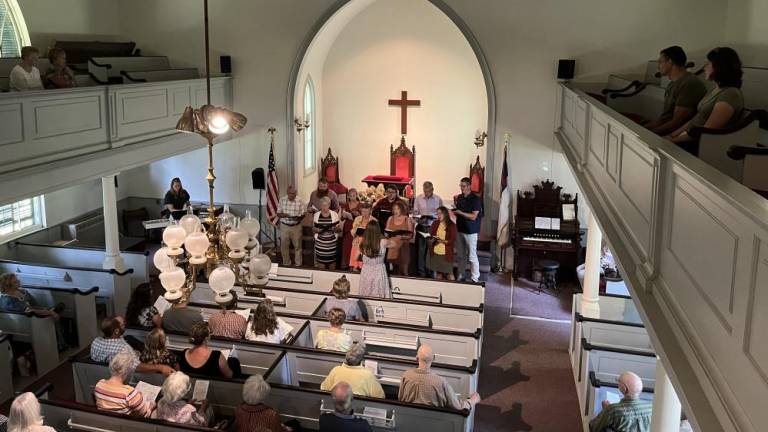Sussex County History Today: The Old Clove Church

My eyes welled up with tears. I love our Sussex County. There are times that some core values emerge from the din of everyday life; long-standing traditions that are hard to describe. One finds it difficult to discern these traditions and it is even more challenging to explain. I will try to elucidate a deep-routed one from a recent event.
As summer turns to September, when the leaves begin to fall and the weather chills, there is an annual church service at the Old Clove Church.
The friends of the Old Clove Church open the doors for a sermon and the tradition continued. Steeped in Christian faith, and the stirring word delivered in a strong sermon—reminiscent of those days of the Second Great Awakening—is the activity that pierced the wooden walls of Clove Church. This year many participants spilled in, entering by one of two front doors—a custom from another era—and this year were led by congregants from the Sussex Christian Reformed Church. Full pews below and many worshippers in the loft above, shared a spirited service. Some years in the past music has been by provided by the High Point Harmonizers with songs like God Bless America and this year with a melodious chorus from SCRC. Hymns from times of old—Rock of Ages and Great is Thy Faithfulness, and a classic Isaac Watts hymn as well. These are anthems which have stood the test of time and which preserve our nation’s mood at its beginning. The resident old organ gave forth a sweet reedy sound that was laboriously produced by the organist’s legs pumping up and down on the leather bellows of the unit. Members of the associated Daughters of the American Revolution were devotedly present in their period docent attire.
Following the service, refreshment was on the green grass lawn beside the church. Homemade cookies were on the table and locally produced delicious apple cider from the nearby Beemerville Orchard was enjoyed. Camaraderie abounded, along with laughter collective memories and catching up, and all shared the reflection of long relationships and good times experienced over the years.
My tears of joy observed the country spirit, the rural pride, the desire by many to preserve our heritage and to again participate in the time-tested ways of maintaining civility and tradition.
Delving into the history of this event, the church congregation was from the time of the Revolutionary War. In the northern stretches of the county, amongst the rolling hills and sandy eskers from the Ice Age, upon which the Holstein cows munch grasses; on the steeper slopes where the land increases in gradient to reach the edges of the Kittatinny Ridge and High Point, there’s a lovely spot known as “The Clove.”
According to old descriptions, including those of Reverend Peter Kanouse, some of the earliest settlers were Dutch who came from upper reaches of the Hudson River down to the area of Wantage. Many came from Esopus on the Hudson’s western shores. Wonderfully preserved Dutch homes remain there for sightseeing today. And they lived here in those early days in the most primitive log cabins and endured cold winters.
During the 1950s many persons of Dutch origin came to Wantage. They brought dairy farming talent with them and have, to this day, continued our heritage of farming and production of milk.
The original congregation was of Dutch Reformed, and later joined with Presbyterian. Hosting several revivals the numbers reached to around 600 during the mid 1800s. There was an ebb of attendance in the early 1900s. an early example of transitional architecture, combining Greek Revival and Victorian Gothic Styles. The foundation is laid without cement and made of squared blocks of stone. Nearby Old Clove Church Cemetery is a sleepy place along the road which has headstones denoting the early church members, and a small section is the final resting place for slaves. Students at Mount Retirement Seminary, a local boarding school, which opened in 1883, attended services at Old Clove Church. Harvest Home suppers were held on the church lawn under tents. In June of 1982, the Old Clove Church was placed on the New Jersey and National Registers of Historic Places.
The day was a time of reflection on how our county’s early inhabitants worshipped. The service also showed that the spirit of yesteryear was certainly still alive today; a spirit of strong Christian faith, earnest hard work, a Harvest Home attitude of warm sharing, and fellowship with friends and family of our rural community. The day was a reassurance of the sustenance of how life has been lived here in The Clove for well over 200 years.